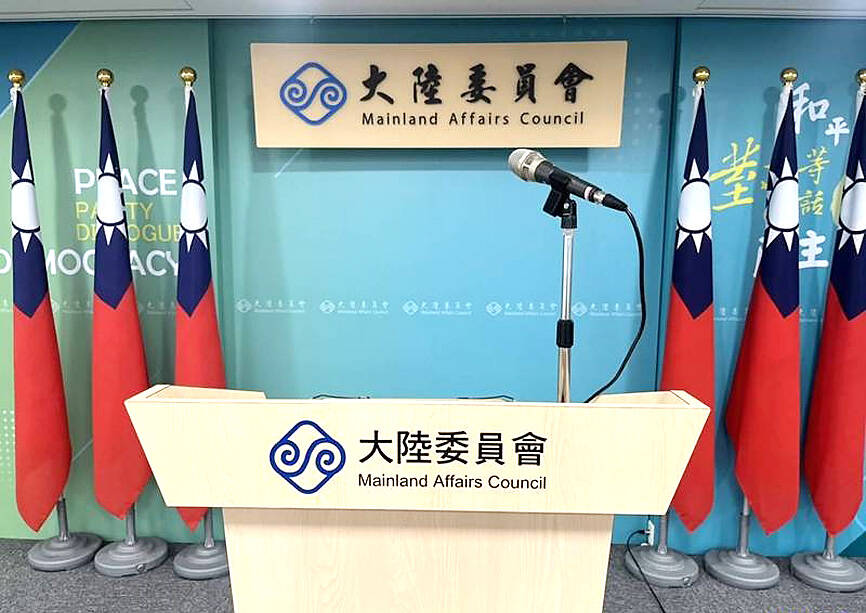Beijing is seeking to discuss unification with Taiwanese businesses and other institutions “through a variety of channels,” the latest Mainland Affairs Council (MAC) report on China says.
In a written report to the Legislative Yuan that MAC Minister Chiu Tai-san (邱太三) is expected to deliver in the legislature today, the council says that China is increasingly using political, military and economic coercion against Taiwan, and employing an alternating hard-soft strategy in its “united front” efforts.
The report suggests that Beijing has changed its policies on Taiwan in response to the regional situation and Sino-US relations.

Taipei Times file photo
“The authorities in Beijing have increased efforts to counter ‘secession’ and what they see as interference by foreign forces, and are looking to bolster exchanges with Taiwan aimed at fostering unification,” the report says.
“At the same time, China is trying to counter growing recognition of Taiwan’s interests in the international community, and hinder support for Taiwan,” it says.
As part of the Chinese Communist Party’s enhanced policy on Taiwan — made clear during its 20th National Congress in October last year, and at last week’s 14th National Committee of the Chinese People’s Political Consultative Conference and the National People’s Congress — it has “stepped up efforts to work with Taiwan, frequently inviting exchanges with people from Taiwan’s grassroots, local leadership and business community, and promoted resumption of cross-strait exchanges,” the report says.
China’s Taiwan Affairs Office has been aggressively promoting a “cross-strait economic and trade united front,” it adds.
“However, China’s economic outlook for this year is still not good, despite international organizations raising their outlook for China’s economic growth,” it says.
The report says the factors affecting China’s economy include continued depression of the real-estate market, an expansion of local fiscal deficits, the shrinking of China’s working population and growing unemployment.
“China’s rebound this year will be significantly weaker than in 2021. Structurally low growth might be the new normal for China’s economy,” it says.
Statistics show that cross-strait trade last year, including with Hong Kong, amounted to US$271.39 billion, a decrease of 0.6 percent from the previous year, it says.
The report highlights that the proportion of Taiwanese exports to China dropped from 43.9 percent in 2020 to 38.8 percent last year.
“Beijing should properly acknowledge and respect the sovereignty of the Republic of China, as well as the democracy and freedom that Taiwanese value,” the report says.
“Beijing should aim to improve cross-strait relations pragmatically, replacing military coercion and economic pressure on Taiwan with dialogue based on rationality, equality and mutual respect,” it says.

Taiwan is projected to lose a working-age population of about 6.67 million people in two waves of retirement in the coming years, as the nation confronts accelerating demographic decline and a shortage of younger workers to take their place, the Ministry of the Interior said. Taiwan experienced its largest baby boom between 1958 and 1966, when the population grew by 3.78 million, followed by a second surge of 2.89 million between 1976 and 1982, ministry data showed. In 2023, the first of those baby boom generations — those born in the late 1950s and early 1960s — began to enter retirement, triggering

ECONOMIC BOOST: Should the more than 23 million people eligible for the NT$10,000 handouts spend them the same way as in 2023, GDP could rise 0.5 percent, an official said Universal cash handouts of NT$10,000 (US$330) are to be disbursed late next month at the earliest — including to permanent residents and foreign residents married to Taiwanese — pending legislative approval, the Ministry of Finance said yesterday. The Executive Yuan yesterday approved the Special Act for Strengthening Economic, Social and National Security Resilience in Response to International Circumstances (因應國際情勢強化經濟社會及民生國安韌性特別條例). The NT$550 billion special budget includes NT$236 billion for the cash handouts, plus an additional NT$20 billion set aside as reserve funds, expected to be used to support industries. Handouts might begin one month after the bill is promulgated and would be completed within

NO CHANGE: The TRA makes clear that the US does not consider the status of Taiwan to have been determined by WWII-era documents, a former AIT deputy director said The American Institute in Taiwan’s (AIT) comments that World War-II era documents do not determine Taiwan’s political status accurately conveyed the US’ stance, the US Department of State said. An AIT spokesperson on Saturday said that a Chinese official mischaracterized World War II-era documents as stating that Taiwan was ceded to the China. The remarks from the US’ de facto embassy in Taiwan drew criticism from the Ma Ying-jeou Foundation, whose director said the comments put Taiwan in danger. The Chinese-language United Daily News yesterday reported that a US State Department spokesperson confirmed the AIT’s position. They added that the US would continue to

The National Development Council (NDC) yesterday unveiled details of new regulations that ease restrictions on foreigners working or living in Taiwan, as part of a bid to attract skilled workers from abroad. The regulations, which could go into effect in the first quarter of next year, stem from amendments to the Act for the Recruitment and Employment of Foreign Professionals (外國專業人才延攬及僱用法) passed by lawmakers on Aug. 29. Students categorized as “overseas compatriots” would be allowed to stay and work in Taiwan in the two years after their graduation without obtaining additional permits, doing away with the evaluation process that is currently required,